让步、条件状语从句
条件状语从句和让步状语从句II

4.Many of them turned a deaf ear to his advice, C ________ they knew it to be valuable.(2007浙江) A. as if B. now that C. even though D. so that
考查重点
1)although与though可互换,都可以与yet,still连用,但不能和but连用。
2)While也可引导让步状语从句,这一特点容易被考生忽视。
3)Whatever修饰名词,“无论什么”,however修饰形容词、副词,“无论多 么,无论怎么”。 4)even if/even though(即使)与as if/as though(好像)这两组学生容易混淆, 也是出题者关注的对象,平时要记准含义
【解析】考查状语从句。此处考查-ever引导的让步状语从句。通过分析从句, 可知句子不缺少主干成分,故排除代词ABD项。通过句子含义“在全球经济形势 下,无论在什么地方一种治疗癌症的新药的发现都会在全世界创造很多经济可能 性。”可以确定答案。
A 2. You should try to get a good night’s sleep ________much work you have to do.(2004湖北) A. however B. no matter C. although D. whatever
【解析】考查状语从句中引导词的使用.根据句子含义“他们当中很多人并不听他 的建议,即使他们知道他的建议是很有价值的”可以确定答案。
如何理解并正确运用条件和让步状语从句
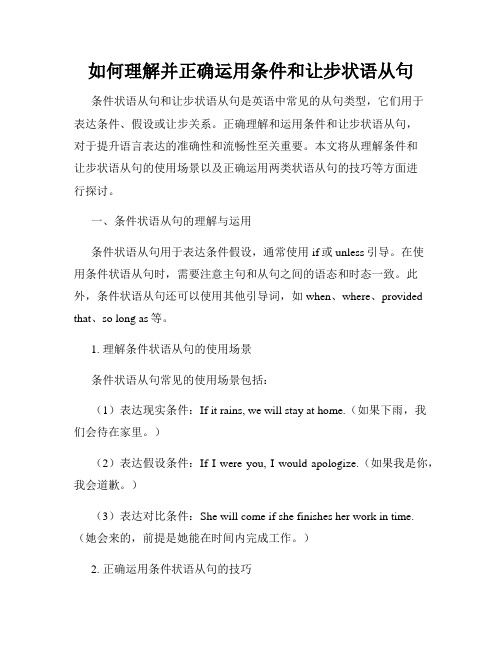
如何理解并正确运用条件和让步状语从句条件状语从句和让步状语从句是英语中常见的从句类型,它们用于表达条件、假设或让步关系。
正确理解和运用条件和让步状语从句,对于提升语言表达的准确性和流畅性至关重要。
本文将从理解条件和让步状语从句的使用场景以及正确运用两类状语从句的技巧等方面进行探讨。
一、条件状语从句的理解与运用条件状语从句用于表达条件假设,通常使用if或unless引导。
在使用条件状语从句时,需要注意主句和从句之间的语态和时态一致。
此外,条件状语从句还可以使用其他引导词,如when、where、provided that、so long as等。
1. 理解条件状语从句的使用场景条件状语从句常见的使用场景包括:(1)表达现实条件:If it rains, we will stay at home.(如果下雨,我们会待在家里。
)(2)表达假设条件:If I were you, I would apologize.(如果我是你,我会道歉。
)(3)表达对比条件:She will come if she finishes her work in time.(她会来的,前提是她能在时间内完成工作。
)2. 正确运用条件状语从句的技巧(1)注意时态和语态的一致性:如果主句是一般现在时,那么条件状语从句通常使用一般现在时;如果主句是一般过去时,那么条件状语从句多使用过去完成时或过去将来时。
(2)注意虚拟语气的使用:在表达假设条件时,条件状语从句常常使用虚拟语气。
例如:If I were you, I would study harder.(如果我是你,我会更加努力学习。
)二、让步状语从句的理解与运用让步状语从句用于表达尽管某种情况存在,但仍然达成某种结果的关系。
常见的让步状语从句引导词包括although、though、even if、even though等。
1. 理解让步状语从句的使用场景让步状语从句常见的使用场景包括:(1)表达尽管某种情况存在:Although it was raining, they still went out for a walk.(尽管下雨了,他们还是出去散步了。
22.条件状语从句和让步状语从句
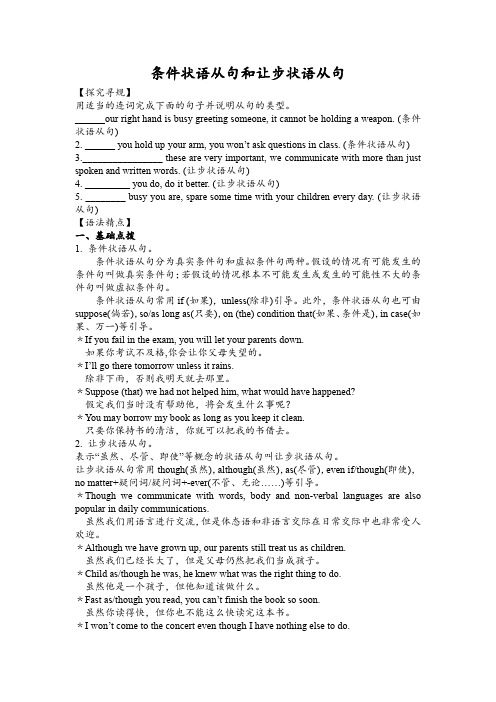
条件状语从句和让步状语从句【探究寻规】用适当的连词完成下面的句子并说明从句的类型。
__ our right hand is busy greeting someone, it cannot be holding a weapon. (条件状语从句)2. ______ you hold up your arm, you won’t ask questions in class. (条件状语从句)3.________________ these are very important, we communicate with more than just spoken and written words. (让步状语从句)4. _________ you do, do it better. (让步状语从句)5. ________ busy you are, spare some time with your children every day. (让步状语从句)【语法精点】一、基础点拨1. 条件状语从句。
条件状语从句分为真实条件句和虚拟条件句两种。
假设的情况有可能发生的条件句叫做真实条件句;若假设的情况根本不可能发生或发生的可能性不大的条件句叫做虚拟条件句。
条件状语从句常用if (如果),unless(除非)引导。
此外,条件状语从句也可由suppose(倘若),so/as long as(只要),on (the) condition that(如果、条件是),in case(如果、万一)等引导。
﹡If you fail in the exam, you will let your parents down.如果你考试不及格,你会让你父母失望的。
﹡I’ll go th ere tomorrow unless it rains.除非下雨,否则我明天就去那里。
﹡Suppose (that) we had not helped him, what would have happened?假定我们当时没有帮助他,将会发生什么事呢?﹡You may borrow my book as long as you keep it clean.只要你保持书的清洁,你就可以把我的书借去。
条件状语从句和让步状语从句
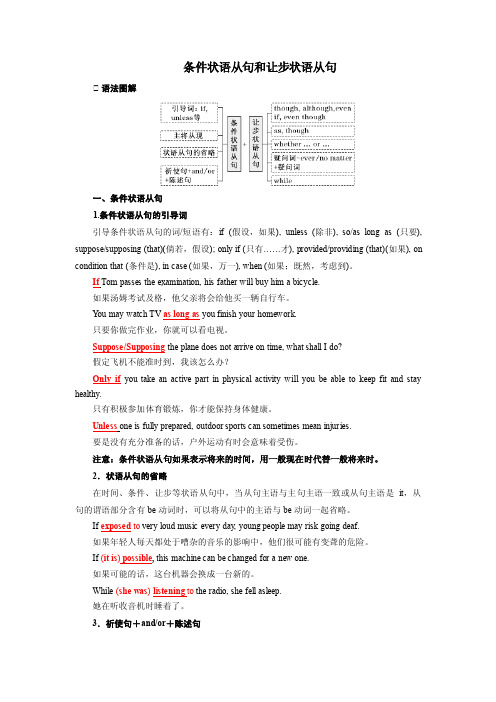
条件状语从句和让步状语从句语法图解一、条件状语从句1.条件状语从句的引导词引导条件状语从句的词/短语有:if (假设,如果), unless (除非), so/as long as (只要), suppose/supposing (that)(倘若,假设); only if (只有……才), provided/providing (that)(如果), on condition that (条件是), in case (如果,万一), when (如果;既然,考虑到)。
If Tom passes the examination, his father will buy him a bicycle.如果汤姆考试及格,他父亲将会给他买一辆自行车。
Y ou may watch TV as long as you finish your homework.只要你做完作业,你就可以看电视。
Suppose/Supposing the plane does not arrive on time, what shall I do?假定飞机不能准时到,我该怎么办?Only if you take an active part in physical activity will you be able to keep fit and stay healthy.只有积极参加体育锻炼,你才能保持身体健康。
Unless one is fully prepared, outdoor sports can sometimes mean injuries.要是没有充分准备的话,户外运动有时会意味着受伤。
注意:条件状语从句如果表示将来的时间,用一般现在时代替一般将来时。
2.状语从句的省略在时间、条件、让步等状语从句中,当从句主语与主句主语一致或从句主语是it,从句的谓语部分含有be动词时,可以将从句中的主语与be动词一起省略。
If exposed to very loud music every day, young people may risk going deaf.如果年轻人每天都处于嘈杂的音乐的影响中,他们很可能有变聋的危险。
条件让步状语从句
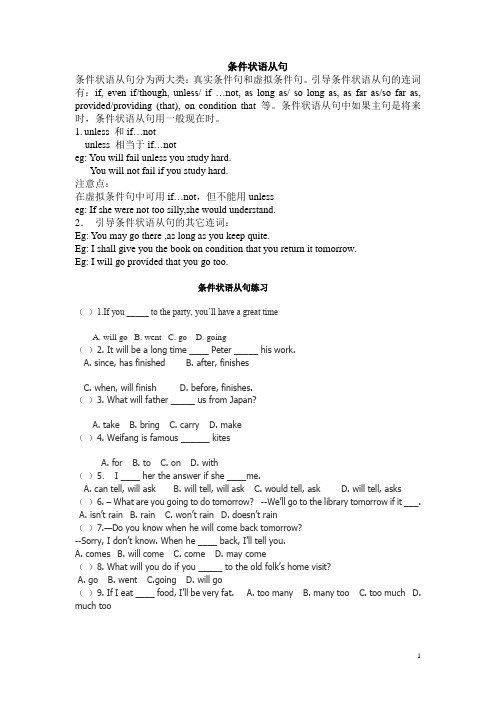
条件状语从句条件状语从句分为两大类:真实条件句和虚拟条件句。
引导条件状语从句的连词有:if, even if/though, unless/ if …not, as long as/ so long as, as far as/so far as, provided/providing (that), on condition that 等。
条件状语从句中如果主句是将来时,条件状语从句用一般现在时。
1.unless 和if…notunless 相当于if…noteg: You will fail unless you study hard.You will not fail if you study hard.注意点:在虚拟条件句中可用if…not,但不能用unlesseg: If she were not too silly,she would understand.2.引导条件状语从句的其它连词:Eg: You may go there ,as long as you keep quite.Eg: I shall give you the book on condition that you return it tomorrow.Eg: I will go provided that you go too.条件状语从句练习()1.If you _____ to the party, you’ll have a great timeA. will goB. wentC. goD. going()2. It will be a long time ____ Peter _____ his work.A. since, has finishedB. after, finishesC. when, will finishD. before, finishes.()3. What will father _____ us from Japan?A. takeB. bringC. carryD. make()4. Weifang is famous ______ kitesA. forB. toC. onD. with()5.I ____ her the answer if she ____me.A. can tell, will askB. will tell, will askC. would tell, askD. will tell, asks()6. – What are you going to do tomorrow? --We’ll go to the library tomorrow if it ___.A. isn’t rainB. rainC. won’t rainD. doesn’t rain()7.—Do you know when he will come back tomorrow?--Sorry, I don’t know. When he ____ back, I’ll tell you.A. comesB. will comeC. comeD. may come()8. What will you do if you _____ to the old folk’s home visit?A. goB. wentC.goingD. will go()9. If I eat ____ food, I’ll be very fat. A. too many B. many too C. too much D. much too()10. I’ll give the book to him if he ___ here next Sunday.A. will comeB. comesC. is comingD. came()11. There ____an English film in our school tomorrow.A. is going to haveB. will haveC. is going to beD. has()12. Could you tell us where ____?A. will the next Olympic Games heldB. the next Olympic Games will be heldC. would the next Olympic Games be heldD. the next Olympic Games would be held ()13. When my mother returned last night, I ____ a book.A. readB. am readingC. was readingD. am going to read()14.What ____ you ____ when it began to rain?A. do, doB. were, doingC. are, doing Ddid, do()15. I’ll wake you up when he ____back.A. willB. is going to comeC. comesD. come二、完成句子(每小题4分)1.如果他到的晚了会发生什么事情?What ______ _____ if he ____ late?2. 如果努力学习,你就会取得好成绩。
条件状语从句让步状语从句

__________, he doesn’t know how to manage people well. A. Smart as Jack is B. As Jack is smart C. Jack is so smart D. As smart Jack is
பைடு நூலகம்
__________________admire his Much as/though I courage, I don’t think he acted wisely. 尽管我很欣赏他的勇气,但我认为 他的行为并不明智。 Hot as/though _________________ the night air was, we sleep deeply because we were so tired after the long journey. 尽管晚上很热,但由于长途旅行的 劳累,我们还是睡得很熟。
1.though/although 2. Even though/if Though/Although 3. though/although 4. unless 5. In case 6. however/no matter how 7. in case 8. Though/Although 9. Unless 10. Whenever/no matter when
3.不管他怎么努力,他还是不能打 开那个门。(as/though) Try as/though he might, he could not open the door. 4.不管怎样努力,我都赶不上他。 However (= No matter how) hard I try, I can never catch up with him.
11. Whatever/ _______________________ No matter what a man’s age, he can reduce it several years by wearing a confident smile. 12. Attractive _________ as/ though the device might seem, “My wife has already done that by herself” was a common response after people seeing it when it was introduced on show this week.
高中必备知识点解析让步状语从句与条件状语从句的区别
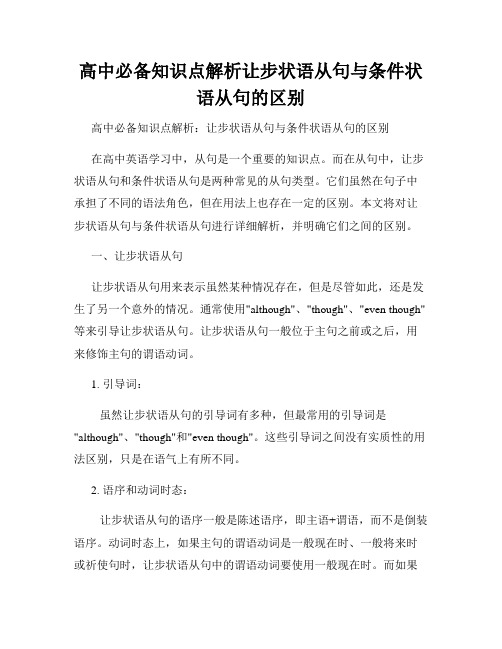
高中必备知识点解析让步状语从句与条件状语从句的区别高中必备知识点解析:让步状语从句与条件状语从句的区别在高中英语学习中,从句是一个重要的知识点。
而在从句中,让步状语从句和条件状语从句是两种常见的从句类型。
它们虽然在句子中承担了不同的语法角色,但在用法上也存在一定的区别。
本文将对让步状语从句与条件状语从句进行详细解析,并明确它们之间的区别。
一、让步状语从句让步状语从句用来表示虽然某种情况存在,但是尽管如此,还是发生了另一个意外的情况。
通常使用"although"、"though"、"even though"等来引导让步状语从句。
让步状语从句一般位于主句之前或之后,用来修饰主句的谓语动词。
1. 引导词:虽然让步状语从句的引导词有多种,但最常用的引导词是"although"、"though"和"even though"。
这些引导词之间没有实质性的用法区别,只是在语气上有所不同。
2. 语序和动词时态:让步状语从句的语序一般是陈述语序,即主语+谓语,而不是倒装语序。
动词时态上,如果主句的谓语动词是一般现在时、一般将来时或祈使句时,让步状语从句中的谓语动词要使用一般现在时。
而如果主句的谓语动词是一般过去时,则让步状语从句中的谓语动词要使用过去完成时。
举个例子:1. Although it was raining, they still went hiking.虽然下着雨,但他们还是去了远足。
2. Though he was tired, he continued working.尽管他很累,但他仍然继续工作。
二、条件状语从句条件状语从句用来表示某种情况的发生取决于另一种情况是否成立。
通常使用"if"、"unless"、"provided/providing"等来引导条件状语从句。
条件和让步状语从句

• You can go out as long as you promise to be back before 11 0’clock. • I’ll lend you my computer on condition that you keep it in good shape. • Given that he doesn’t agree, what shall we do? • Only if you have read this book can you know how to operate the computer.
• As引导状语从句的倒装 • ① 表语的倒装: n/adj + as+主语+系 动词 (名词做表语时通常省略冠词) • Although Child as he he was is, tired, he knows a lot. • Tired as he he is was, he still went on Althogh a child, with his work. Althogh he was he tall, • Tall as / though was, he couldn’t reach the top shelf.
引导让步状语从句的连词:
though,although, as , while; (虽然,尽管) even if/ even though; (即使) no matter who/ what/ when / where/ which / how ( whoever, whatever, whenever, wherever,
• (2) only if and if only • only if (只要…) 引导真实的条件句,若放于 句首,主句要用部分倒装。 • --Will you come? • --Only if you promise not to invite Mary. • I’ll come only if you promise you won’t invite Mary. • Only if you promise you won’t invite Mary, _____________( I’ll come) will I come
条件状语从句和让步状语从句

条件状语从句的结构
条件状语从句的结构是“如果/除非+主句”。表示虚拟条件。
条件状语从句的使用
条件状语从句用于表达某个条件下可能发生的情况。它可以用来描述假设、建议、愿望或者可能性等。
条件状语从句的例句
1 如果明天下雨,我们 2 除非你努力学习,否 3 如果你有什么问题,
就呆在家里。
则你不会通过考试。
请随时问我。
让步状语从句的定义
让步状语从句用于表示让步或相反的情况。它通常由一个引导词引导,比如 “虽然”、“尽管”。
让步状语从句的结构
让步状语从句的结构是“引导词+从句”。其中,引导词可以是“虽然”、“尽管”、“不管”等。
让步状语从句的使用
让步状语从句用于表达一种让步的情况,即尽管某个条件存在,但另一种情 况仍然发生。
条件状语从句和让步状语 从句
条件状语从句用于描述一种条件或假设,结构为“如果/除非+主句”,它可以表 达真实条件、虚拟条件等多种情况。让步状语从句则用于表示让步或相反的 情况。
条件状语从句的定义
条件状语从句是用来描述某种条件或假设的句子。它通常由一个引导词引导, 常见的引导词有“如果”、“除非”等。
语法中的让步与条件状语从句
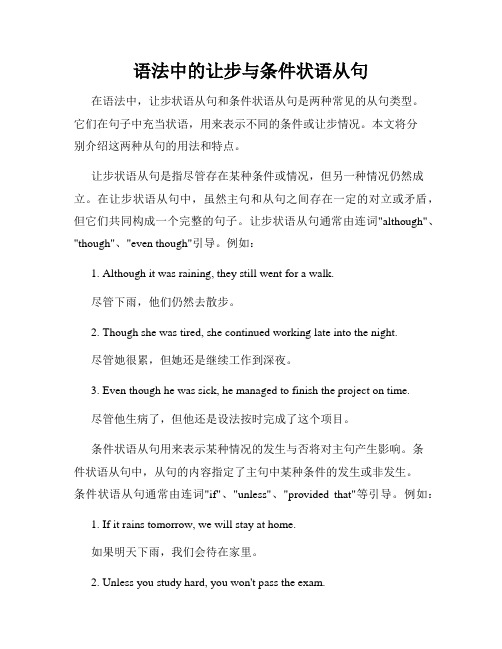
语法中的让步与条件状语从句在语法中,让步状语从句和条件状语从句是两种常见的从句类型。
它们在句子中充当状语,用来表示不同的条件或让步情况。
本文将分别介绍这两种从句的用法和特点。
让步状语从句是指尽管存在某种条件或情况,但另一种情况仍然成立。
在让步状语从句中,虽然主句和从句之间存在一定的对立或矛盾,但它们共同构成一个完整的句子。
让步状语从句通常由连词"although"、"though"、"even though"引导。
例如:1. Although it was raining, they still went for a walk.尽管下雨,他们仍然去散步。
2. Though she was tired, she continued working late into the night.尽管她很累,但她还是继续工作到深夜。
3. Even though he was sick, he managed to finish the project on time.尽管他生病了,但他还是设法按时完成了这个项目。
条件状语从句用来表示某种情况的发生与否将对主句产生影响。
条件状语从句中,从句的内容指定了主句中某种条件的发生或非发生。
条件状语从句通常由连词"if"、"unless"、"provided that"等引导。
例如:1. If it rains tomorrow, we will stay at home.如果明天下雨,我们会待在家里。
2. Unless you study hard, you won't pass the exam.除非你努力学习,否则你不会通过考试。
3. Provided that you finish your work, you can go out and play.只要你完成工作,就可以出去玩。
条件状语和让步状语从句
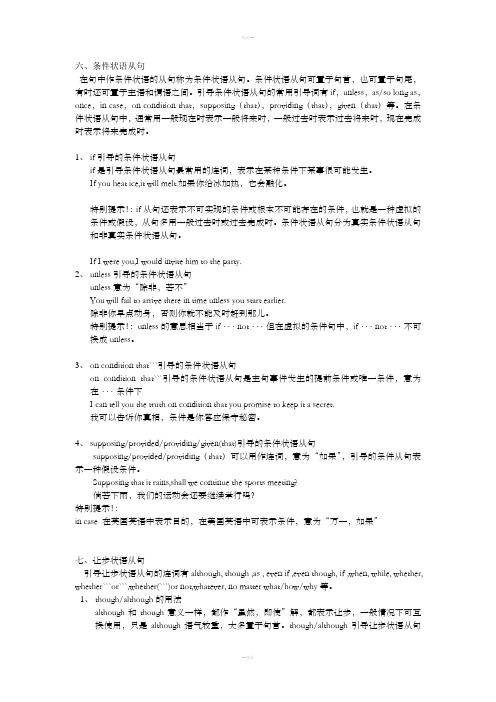
六、条件状语从句在句中作条件状语的从句称为条件状语从句。
条件状语从句可置于句首,也可置于句尾,有时还可置于主语和谓语之间。
引导条件状语从句的常用引导词有if,unless,as/so long as,once,in case,on condition that,supposing(that),providing(that),given(that)等。
在条件状语从句中,通常用一般现在时表示一般将来时,一般过去时表示过去将来时,现在完成时表示将来完成时。
1、if引导的条件状语从句if是引导条件状语从句最常用的连词,表示在某种条件下某事很可能发生。
If you heat ice,it will melt.如果你给冰加热,它会融化。
特别提示!:if从句还表示不可实现的条件或根本不可能存在的条件,也就是一种虚拟的条件或假设,从句多用一般过去时或过去完成时。
条件状语从句分为真实条件状语从句和非真实条件状语从句。
If I were you,I would invite him to the party.2、unless引导的条件状语从句unless意为“除非,若不”You will fail to arrive there in time unless you start earlier.除非你早点动身,否则你就不能及时赶到那儿。
特别提示!:unless的意思相当于if···not···但在虚拟的条件句中,if···not···不可换成unless。
3、on condition that```引导的条件状语从句on condition that```引导的条件状语从句是主句事件发生的提前条件或唯一条件,意为在···条件下I can tell you the truth on condition that you promise to keep it a secret.我可以告诉你真相,条件是你答应保守秘密。
如何理解并正确运用让步状语从句和条件状语从句

如何理解并正确运用让步状语从句和条件状语从句让步状语从句和条件状语从句是英语语法中常用的句子结构,它们的正确使用可以使句子更加丰富多样,增强语言表达的灵活性。
本文将详细介绍什么是让步状语从句和条件状语从句,并提供一些有关使用这两种句子结构的实用技巧。
1. 让步状语从句让步状语从句是用来表示与主句内容相反或对立的情况,常常使用连词"although"或"though"引导。
让步状语从句与主句之间的关系是虽然主句发生了某种情况,但是让步从句中的情况也同样存在。
让步状语从句可以出现在句首、句中或句尾,具体位置的选择取决于语境和表达的重要性。
例如:- Although it was raining, we still went for a walk.- We decided to go swimming despite the bad weather.- Despite feeling tired, she continued working late into the night.2. 条件状语从句条件状语从句是用来表示条件的从句,常常使用连词"if"或"unless"引导。
条件状语从句与主句之间的关系是如果条件成立,则主句的情况也会发生。
条件状语从句可以用来表示现实的、可能的或假设的情况。
例如:- If you study hard, you will pass the exam.- Unless she comes early, we will leave without her.- Provided that it doesn't rain, we will have a picnic tomorrow.3. 让步状语从句的使用技巧为了正确运用让步状语从句,我们需要注意以下几点:- 让步状语从句通常使用"although"或"though"引导,在句子中起连接作用,并引出与主句相反的情况。
条件让步状语从句

as, though 引导的让步状语从句, 从句中 的表语、状语(副词)或动词等可以提 前,作表语的单数可数名词冠词需省略。 (请标出倒装的部分) eg: Young Young as he is , he knows a lot. eg: Hard as he works, he makes little progress. eg: Child as he is, he knows much English. eg: Object as you may, I will go.(反对)
(4) supposing/suppose/providing/provided/ given (that) 如果 eg: Supposing (that) it rains, shall we continue the sports meeting? eg: Providing/provided that you have one million dollars, what will you do ?
判断对错 No matter what you say is of no use now .
×
Whatever you say is of no use now . √ (主语从句) I don’t believe no matter who looks away from me when talking. × I don’t believe whoever looks away from me when talking. √ (宾语从句)
初中英语知识点归纳条件状语从句与让步状语从句的区别
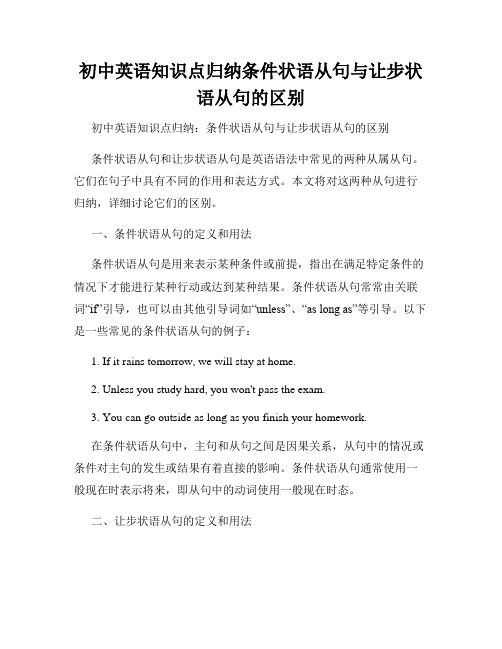
初中英语知识点归纳条件状语从句与让步状语从句的区别初中英语知识点归纳:条件状语从句与让步状语从句的区别条件状语从句和让步状语从句是英语语法中常见的两种从属从句。
它们在句子中具有不同的作用和表达方式。
本文将对这两种从句进行归纳,详细讨论它们的区别。
一、条件状语从句的定义和用法条件状语从句是用来表示某种条件或前提,指出在满足特定条件的情况下才能进行某种行动或达到某种结果。
条件状语从句常常由关联词“if”引导,也可以由其他引导词如“unless”、“as long as”等引导。
以下是一些常见的条件状语从句的例子:1. If it rains tomorrow, we will stay at home.2. Unless you study hard, you won't pass the exam.3. You can go outside as long as you finish your homework.在条件状语从句中,主句和从句之间是因果关系,从句中的情况或条件对主句的发生或结果有着直接的影响。
条件状语从句通常使用一般现在时表示将来,即从句中的动词使用一般现在时态。
二、让步状语从句的定义和用法让步状语从句是指尽管存在某种不利的情况或条件,但仍然能够实现某种行动或结果。
让步状语从句通常由关联词“although”、“though”或“even though”等引导。
以下是一些典型的让步状语从句的例子:1. Although it is raining, we can still have a picnic.2. Though he is old, he still works very hard.3. Even though she was tired, she didn't go to bed early.在让步状语从句中,从句中的情况或条件与主句中的行动或结果相对立,但并不妨碍主句的发生。
状语从句让步与条件
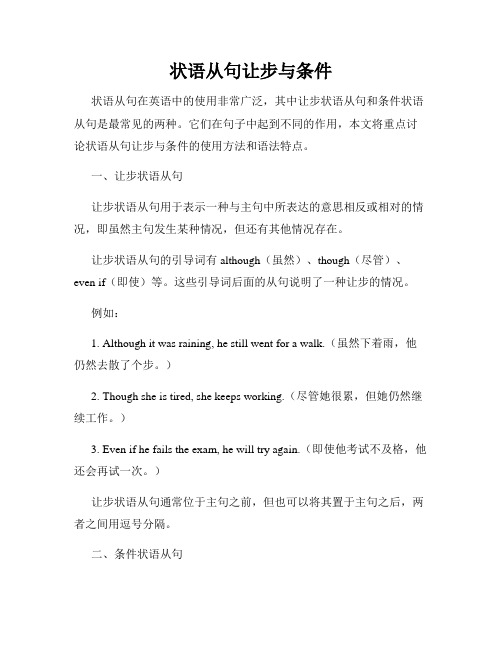
状语从句让步与条件状语从句在英语中的使用非常广泛,其中让步状语从句和条件状语从句是最常见的两种。
它们在句子中起到不同的作用,本文将重点讨论状语从句让步与条件的使用方法和语法特点。
一、让步状语从句让步状语从句用于表示一种与主句中所表达的意思相反或相对的情况,即虽然主句发生某种情况,但还有其他情况存在。
让步状语从句的引导词有although(虽然)、though(尽管)、even if(即使)等。
这些引导词后面的从句说明了一种让步的情况。
例如:1. Although it was raining, he still went for a walk.(虽然下着雨,他仍然去散了个步。
)2. Though she is tired, she keeps working.(尽管她很累,但她仍然继续工作。
)3. Even if he fails the exam, he will try again.(即使他考试不及格,他还会再试一次。
)让步状语从句通常位于主句之前,但也可以将其置于主句之后,两者之间用逗号分隔。
二、条件状语从句条件状语从句是用来表示一种条件与结果的关系,即只有满足某种条件,才能得到相应的结果。
条件状语从句的引导词有if(如果)、unless(除非)、provided/providing (that)(只要)、as long as(只要)等。
从句中的谓语动词可以使用各种时态。
例如:1. If it rains tomorrow, we'll stay at home.(如果明天下雨,我们就呆在家里。
)2. Unless you work hard, you won't succeed.(除非你努力工作,否则你不会成功。
)3. I'll go with you as long as you promise to be back before midnight.(只要你答应在午夜前回来,我就和你一起去。
- 1、下载文档前请自行甄别文档内容的完整性,平台不提供额外的编辑、内容补充、找答案等附加服务。
- 2、"仅部分预览"的文档,不可在线预览部分如存在完整性等问题,可反馈申请退款(可完整预览的文档不适用该条件!)。
- 3、如文档侵犯您的权益,请联系客服反馈,我们会尽快为您处理(人工客服工作时间:9:00-18:30)。
条件状从和让步状从练习
一.单选题
1._______ the forest park is far away, a lot of tourists visit it every year.
A. As
B. When
C. Even though
D. In case
2. The experiment shows that proper amounts of exercise, if ______ regularly, can improve our health. A. being carried out B. carrying out C. carried out D. to carry out
3. You will never gain success you are fully devoted to your work.
A. when
B. because
C. after
D. unless
4. It is hard for the Greek government to get over the present difficulties_________ it gets more financial support from the European Union.
A. if
B. unless
C. because
D. since
5. It was a nice meal, _______a little expensive.
A. though
B. whether
C. as
D. since
6. I don’t really like the author,_______ I have to admit his books are very exciting. A. although
B. unless
C. until
D. once
7. I don't believe we've met before, _____ I must say you do look familiar.
A. therefore
B. although
C. since
D. unless
8. You can’t borrow books from the school library ______ you get your student card.
A. unless
B. if
C. while
D. as
9. I'll be out for some time. ______ anything important happens, call me up immediately.
A. In case
B. As if
C. Even though
D. Now that
10. One's life has value ____one brings value to the life of others.
A. so that
B. no matter how
C. as long as
D. except that
二.填空题
11. In the global economy, a new drug for cancer, ______ it is discovered, will create many economic possibilities around the world.
12. One can always manage to do more things, ____ full one’s schedule is in life.
13.________ great difficulties we are faced with, we’ll never give up.
14. ________ great the difficulties are, we’ll never give up.
15. ______ we have enough evidence, we can't win the case.
16. If _____ to look after luggage for someone else, inform the police at once. (ask)
17.____________ the weather is like tomorrow, I will set out for Hongkong.
18. Many of them turned a deaf ear to his advice ___________ they know it to be valuable.
19. Much ______ I admire David as a poet, I don’t like him as a man.
20. In time of serious accidents, ______ we know some basic things about first aid, we can save lives.
三.改错题
21、It won’t matter even he refuses.
22. Though the work was difficult, but we managed to finish it in time.
23. I’m not going to talk on the point any further, though it is neither important nor very interesting.
24. You will be late if you leave immediately.
25. Take an umbrella with you in case of it should rain.。
